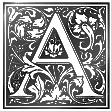|
|---|
| 16:1 |
 nd hee said also vnto his disciples, There was a certaine rich man which had a Steward, and the same was accused vnto him that he had wasted his goods. nd hee said also vnto his disciples, There was a certaine rich man which had a Steward, and the same was accused vnto him that he had wasted his goods. |
|
| 16:2 |
And hee called him, and said vnto him, How is it that I heare this of thee? Giue an accompt of thy stewardship: for thou mayest bee no longer Steward. |
|
| 16:3 |
Then the Steward said within himselfe, What shall I doe, for my lord taketh away from mee the Stewardship? I cannot digge, to begge I am ashamed. |
|
| 16:4 |
I am resolued what to doe, that when I am put out of the stewardship, they may receiue me into their houses. |
|
| 16:5 |
So hee called euery one of his lords detters vnto him, and said vnto the first, How much owest thou vnto my lord? |
|
| 16:6 |
And hee said, An hundred measures of oyle. And hee saide vnto him, Take thy bill, and sit downe quickly, and write fiftie. |
 |
| 16:7 |
Then said hee to another, And how much owest thou? And hee said, An hundred measures of wheat. And hee saide vnto him, Take thy bill and write fourescore. |
 |
| 16:8 |
And the lord commended the vniust Steward, because he had done wisely: for the children of this world are in their generation wiser then the children of light. |
|
| 16:9 |
And I say vnto you, Make to your selues friends of the Mammon of vnrighteousnesse, that when ye faile, they may receiue you into euerlasting habitations. |
 |
| 16:10 |
Hee that is faithfull in that which is least, is faithfull also in much: and he that is vniust in the least, is vniust also in much. |
|
| 16:11 |
If therefore yee haue not bene faithfull in the vnrighteous Mammon, who will commit to your trust the true riches? |
 |
| 16:12 |
And if ye haue not bene faithful in that which is another mans, who shall giue you that which is your owne? |
|
| 16:13 |
No seruant can serue two masters, for either he will hate the one, and loue the other: or else he will hold to the one, and despise the other: yee cannot serue God and Mammon. |
|
| 16:14 |
And the Pharisees also who were couetous, heard all these things: and they derided him. |
|
| 16:15 |
And he said vnto them, Ye are they which iustifie your selues before men, but God knoweth your hearts: for that which is highly esteemed amongst men, is abomination in the sight of God. |
|
| 16:16 |
The law and the Prophets were vntill Iohn: since that time the kingdome of God is preached, and euery man preasseth into it. |
|
| 16:17 |
And it is easier for heauen and earth to passe, then one title of the law to faile. |
|
| 16:18 |
Whosoeuer putteth away his wife, & marrieth another, committeth adultery: and whosoeuer marrieth her that is put away from her husband, committeth adultery. |
|
| 16:19 |
There was a certaine rich man, which was clothed in purple and fine linnen, and fared sumptuously euery day. |
|
| 16:20 |
And there was a certaine begger named Lazarus, which was layde at his gate full of sores, |
|
| 16:21 |
And desiring to bee fed with the crummes which fel from the rich mans table: moreouer the dogges came and licked his sores. |
|
| 16:22 |
And it came to passe that the begger died, and was caried by the Angels into Abrahams bosome: the rich man also died, and was buried. |
|
| 16:23 |
And in hell he lift vp his eyes being in torments, and seeth Abraham afarre off, and Lazarus in his bosome: |
|
| 16:24 |
And he cried, and said, Father Abraham, haue mercy on mee, and send Lazarus, that he may dip the tip of his finger in water, and coole my tongue, for I am tormented in this flame. |
|
| 16:25 |
But Abraham saide, Sonne, remember that thou in thy life-time receiuedst thy good things, and likewise Lazarus euill things, but now he is comforted, and thou art tormented. |
|
| 16:26 |
And besides all this, betweene vs and you there is a great gulfe fixed, so that they which would passe from hence to you, cannot, neither can they passe to vs, that would come from thence. |
|
| 16:27 |
Then he said, I pray thee therefore father, that thou wouldest send him to my fathers house: |
|
| 16:28 |
For I haue fiue brethren, that he may testifie vnto them, lest they also come into this place of torment. |
|
| 16:29 |
Abraham saith vnto him, They haue Moses and the Prophets, let them heare them. |
|
| 16:30 |
And hee said, Nay, father Abraham: but if one went vnto them from the dead, they will repent. |
|
| 16:31 |
And hee said vnto him, If they heare not Moses and the Prophets, neither will they be perswaded, though one rose from the dead. |
|
 nd hee said also vnto his disciples, There was a certaine rich man which had a Steward, and the same was accused vnto him that he had wasted his goods.
nd hee said also vnto his disciples, There was a certaine rich man which had a Steward, and the same was accused vnto him that he had wasted his goods.